Subject Leader: Mrs Tomlinson
At Walton Primary Academy, we use a mastery approach to teach the mathematics National Curriculum. It is our belief that all children are mathematicians but that some may require more time or resources to support them. Our aim is that all children develop an enjoyment, fascination and confidence in maths and to achieve this, we ensure that teachers have excellent levels of subject knowledge and access to high quality resources. Children receive daily mathematics lessons that give them the opportunity to develop new learning as well as revisit and consolidate previous learning.
Our EYFS and KS1 are currently part of the Maths Hubs Mastering Number Programme. This supports children in their development of recalling fluency facts and how to apply them to their learning as well as developing their number-sense.
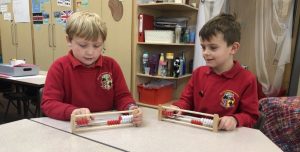
In LKS2, we are using Maths Hubs resources to develop children’s times tables knowledge so that they have quick recall of mental multiplication and division facts. They are then taught how to use and apply these facts to different areas of the maths curriculum.
What will my child/children be learning in maths?
The curriculum map below shows which objectives from the National Curriculum are being taught in each year group. These small steps ensure that children make progress through the year – continually building on prior knowledge – as well as across year groups.
What you will see in lessons?
EYFS
Mathematics in EYFS follows the review, teach, practise, apply method of teaching. Children spend lots of time exploring and reinforcing basic concepts during lessons and in continuous provision. This allows our children to build a secure base of knowledge and vocabulary from which mastery of maths is built. Our intent for EYFS is that children have a deep understanding of the number system first to 5 and then to 10, the relationships between them and the patterns within those numbers, in order to prepare them for Key Stage 1.
Our curriculum provides frequent, rich and varied opportunities to build and apply their understanding across all areas of Mathematics including shape, space and measures. Mathematics is taught daily as a part of a focussed teaching activity in EYFS. Children are then provided with learning activities based upon their teaching, so that they can refine and develop their knowledge and apply the skills they have learnt. In addition to this, opportunities for Mathematics teaching and learning can be seen throughout the routines of the school day, e.g. counting how many children are here today, how many children are away, which book received the most votes to read at the end of the day. Mathematics challenges, as well as learning opportunities, are carefully planned for through the areas of provision in both the indoor and outdoor learning environments. We want all of our children to develop positive attitudes and interests in Mathematics, look for patterns and relationships, ‘have a go’, talk about what they notice and not be afraid to make mistakes.
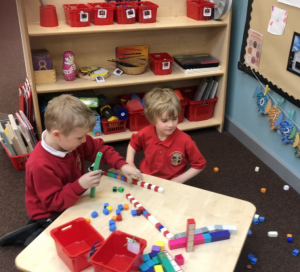
Years 1 to 6
We do not use a set scheme of work, instead, we use a variety of high-quality resources that are tailored to the needs of our children. You will see whole class teaching as it is our aim that all children move through the curriculum together. To support this, children are seated in mixed ability groups and taught using a range of concrete resources, pictorial representations and abstract methods. This enables them to develop a deep understanding of concepts and discover what works best for them. In order to develop children’s mathematical vocabulary, and ability to reason and explain, you will see lots of partner talk and repeating of stem sentences. Children will first practise skills to develop fluency and will also be given the opportunity to develop reasoning and problem-solving skills within each objective. You may see this more orally with younger children (particularly at the start of the year) and written in books as the children move through school. You will also see independence, teamwork, enjoyment, determination and resilience.
As well as following the objectives in the curriculum map for their year group, children will also have the opportunity to practise arithmetic every day either as part of their daily lesson or as a discrete time within the daily timetable.
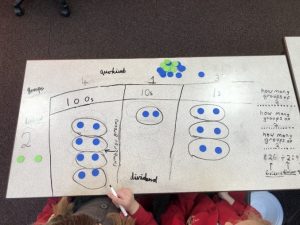
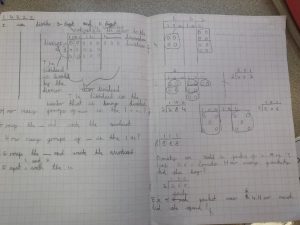
How you can help
From Y3 onwards, all children begin to use a home school maths journal. This will contain learning and examples from class work. These journals serve as a revision guide as children move through school to enable them to look back on previous learning but also show parents the methods children are learning at school and the practical, pictorial and stem sentence resources that support those methods.
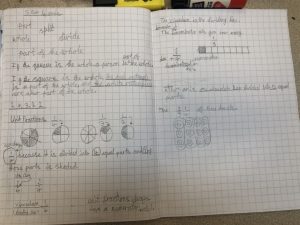
The main focus is supporting children with mental recall specifically addition and subtraction in KS1 and multiplication and division in KS2. We would also encourage parents to help children with mathematical life-skills such as time, money and measure. This can all be done in a practical way whilst fostering a love of maths.
Useful websites
EYFS
https://www.bbc.co.uk/cbeebies/shows/numberblocks
https://play.ttrockstars.com/numbots/dashboard – all children have an individual login
White Rose 1-minute maths app – download free from the app store
KS1
https://play.ttrockstars.com/numbots/dashboard – all children have an individual login
White Rose 1-minute maths app – download free from the app store
https://ttrockstars.com/ – all children have an individual login
https://www.bbc.co.uk/bitesize/subjects/zjxhfg8
KS2
https://ttrockstars.com/ – all children have an individual login
https://www.bbc.co.uk/bitesize/subjects/z826n39
https://diagnosticquestions.com/
https://play.ttrockstars.com/numbots/dashboard – all children have an individual login
White Rose 1-minute maths app – download free from the app store
https://ttrockstars.com/ – all children have an individual login
